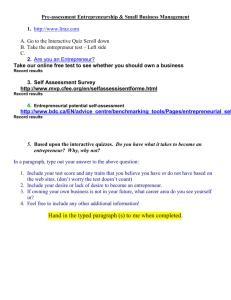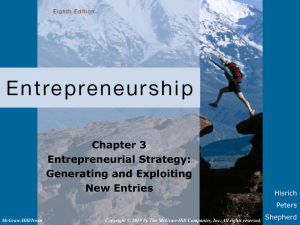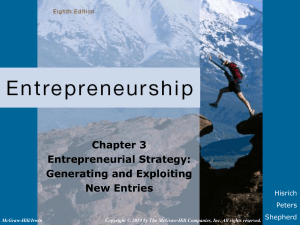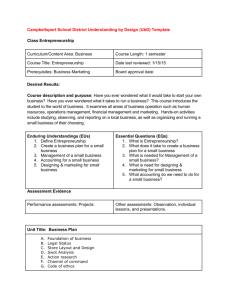Chapter 3 The Individual Entrepreneur
advertisement
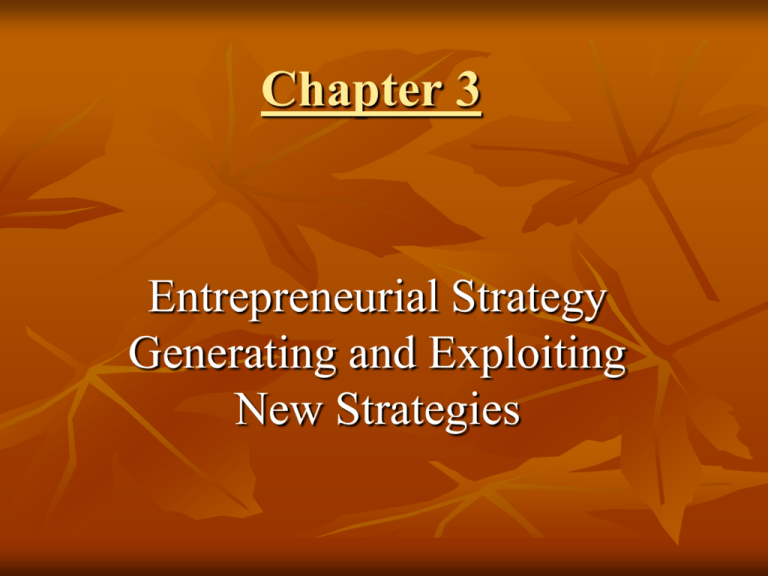
Chapter 3 Entrepreneurial Strategy Generating and Exploiting New Strategies New Entry Offering a new product to an established or new market. which countries, which segments, how to manage and implement marketing effort, how to enter - with intermediaries or directly, with what information. Sourcing - whether to obtain products, make or buy? iii) Investment and control - joint venture, global partner. to enter a new market entrepreneur need to start analysis of, Market… find market information. Product information Match existing products to markets - air, sea, rail, road. Offering New products Product management Manufacturing specifications - Labeling - Packaging - Production control - Market information(for the purpose of update the market. Cont…. Price support. Price support - Establishment of prices - Discounts - Distribution and maintenance of pricelists - Competitive information Cont… promotion /selling support. 3. Promotion/selling support - Advertising - Promotion - Direct mail - trade shows - Printing - Selling (direct) - Sales force - Sale or returns Cont… financial support Financial support - Billing, collecting invoices - voucher - Planning, scheduling budget data - Auditing Stages of entrepreneurial strategy An entrepreneurial strategy has six Key Stages 1.Generation of a New Entry Strategy 2.Exploitation(use) of New Entry Strategy 3.A feedback loop from the New strategy 4. Product adaptation strategy - modifications 5.Availability and security strategy. 6. Low price strategy - New Entry Entrepreneurial Strategy is the set of decisions actins, and reactions that first generate, and then exploit over time . Generation of a new Entry Opportunity Resources as a source of Competitive Advantage Understanding where a sustainable competitive advantage comes from will provide some insight into how entrepreneurs can generate new entries that are likely to provide the basis for high firm from performance over an extended period of time Generation of a new Entry Opportunity Entrepreneurial Resources: The ability to obtain, and then recombine, resources into a bundle that is valuable, to both employees and businessman. Entrepreneurs combines the resources into such a different ways as this bundle of resources provides a firm its capacity to achieve superior performance For Example: A high skilled workforce will be miss use if the organization’s culture, teamwork, communication does not support them Generation of a new Entry Opportunity Market Knowledge: Possession of Information, technology, know-how, and skills that provide insight into a market and its customers Technological Knowledge: Possession of information, technology, know-how and skills that provide insight into ways to create new knowledge Generation of a new Entry Opportunity Window of Opportunity: The period of time when the environment is favorable for entrepreneurs to exploit a particular new entry (2) ENTRY EXPLOITATION Competitive Advantages of ‘being first’ 1. First mover develop a cost advantage 2. First mover face less competitive rivalry 3. First movers can secure important channels 4. First movers are better positioned to satisfy customers 5. First mover gain expertise through participation Cont… ENTRY EXPLOITATION Disadvantages of ‘Being First’ 1. Demand Uncertainty: Considerable difficulty in accurately estimating the potential size of the market, how fast it will grow, and the key dimensions along which it will grow. Cont.. ENTRY EXPLOITATION 3. Uncertainty of Customers: Customers may have considerable difficulty in accurately assessing whether the new product or service provides value for them (3) Feedback loop strategy Feedback loop strategy indicates to study as a whole market and to find the behaviour of customer ,that customer can take satisfaction or they are dissatisfy with using the product. Cont..(4) Product adaptation strategy - modifications The term "product adaptation" can be used to describe a "follower mentality" in product innovation strategy or a particular aspect of business development. The need to develop an adaptation strategy can lead to changes in pricing, delivery and packaging. Ultimately, creating an effective product. adaptation strategy is a critical factor for all businesses that wish to attract a dynamic customer. 5.Availability and security strategy. The security methodology described in this document is designed to help security professionals develop a strategy to protect the availability, integrity, and confidentiality of data in an organization's information technology (IT) system 6. Low price strategy Establishing a relatively low price for a product or service, usually to stimulate demand and acquire market share. This makes the most economic sense for the seller when there are significant economies of scale achievable from high volume production, or when the buyers are price sensitive and the seller has few competitive advantages What is risk reduction strategy. to reduce the risk of the new market place entrepreneur need to use the following important strategy to reduce the risk of market. Market scope strategy. imitation strategy. Managing newness. (1) Market scope strategy. Market scope strategy A choice about which customer group to serve Narrow scope strategy use. Broad scope strategy (2) Imitation strategy. Imitation strategy is that strategy which most of entrepreneur follow it for the purpose of that no one can follow the activities of the business. it means provide those service which no one can copy it. (3) Managing Newness. Learning new task New role assignment. Formal and informal communication.

